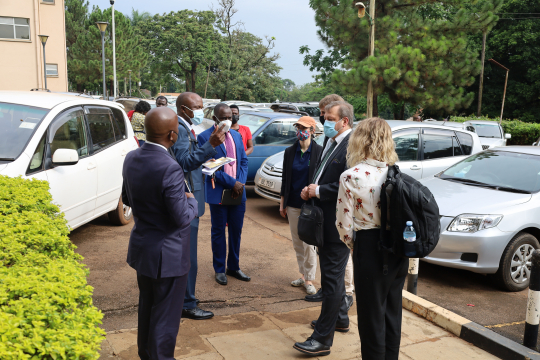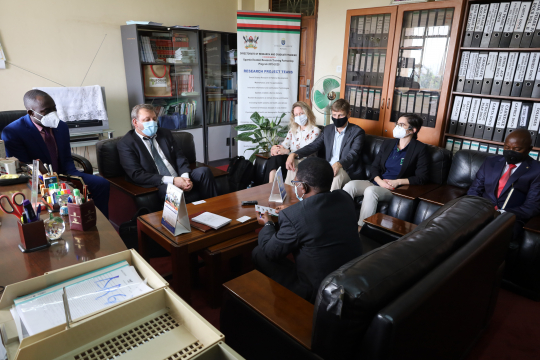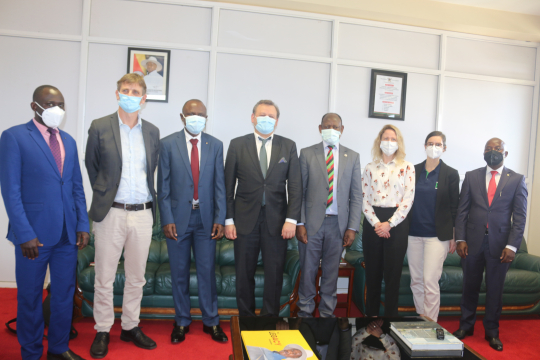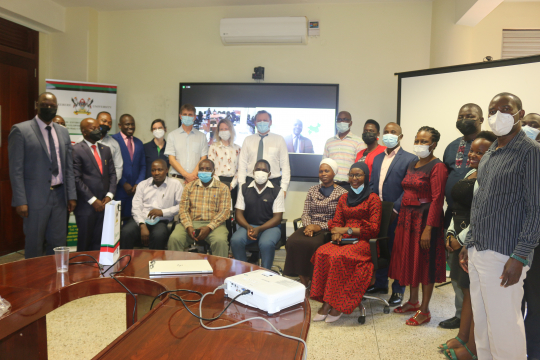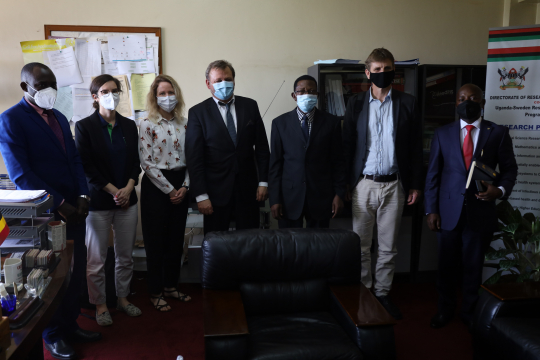A four-man delegation of Swedish environmental economists arrived at Makerere University on 22nd November 2021 to discuss collaborative initiatives on the environment and sustainable development. The delegation was led by the Director of EfD Prof. Gunnar Kohlin from the University of Gothenburg.
The team paid a courtesy call on the office of the Director of Graduate Research and Training, the office of the Vice-chancellor, office of the Principal College of Business and Management Sciences. The team also held a meeting with EfD-Mak research fellows during which the Director, EfD Mak center Prof. Edward Bbaale addressed the guests and participants virtually from Ghana.
The Swedish team was in Uganda to attend the three-day IGE cross-country National Policy Review and Training Workshop in Speke Resort Munyonyo Hotel, from November 23-25, 2021.
The function was being organized by the EfD-Mak-Centre, Uganda in collaboration with the University of Gothenburg, as part of the activities of the Inclusive Green Economy (IGE) capacity building program for senior civil servants and policymakers sponsored by the Swedish International Development Cooperation Agency (Sida).
The purpose of the National Policy Review (NPR) training is to strengthen cross-country peer learning by conducting an analytical review of their neighboring country’s NPR and strengthen networks on Inclusive Green Economy in the region.
The visit by the Swedish team was also in preparation for the EfD Global Annual conference to be hosted by EfD-Mak Center at Makerere university next year 2022.
Prof. Gunnar met with the university's top officials including the Director of Graduate Research and Training Prof. John Buyinza Mukadasi, the Vice-Chancellor Prof. Barnabas Nawangwe, the Principal College of Business and Management Sciences Assoc. Professor Eria Hisali before meeting the EfD Mak research fellows.
Prof. Gunnar Köhlin who was making his maiden visit to Uganda and Makerere University since the inception of the center in 2019, commended the EfD-Mak center for being active and progressive in implementing the activities across the country including policy dialogues, training researchers and civil servants.
Prof. Gunnar appreciated the collaborative efforts between the school of Agricultural Sciences in the college of agricultural and Environmental Sciences and the School of Economics in the College of Business and Management Sciences in nurturing the EfD-Mak center and implementing a number of activities.
In different meetings with university officials, Prof. Gunnar discussed ideas of how to move the EfD research agenda forward.
“The clock is ticking and we have just started a decade to move the global Agenda 2030 and to deal with the implementation of the Paris Agreement to address many challenges such as biodiversity loss, climate change, deforestation among others”
Prof. Gunnar emphasized the need for academia to join the global efforts to implement the conventions and commitments.
"Academia in the past choose to stand aside and not actively join the policy discussions but now, given the urgency of the global challenges academia needs to be brought on board and commit to the implementation of national and international agreements.”
He said this can be done through intensification of research, building academic programs, and forming multidisciplinary research teams to conduct joint research to effectively solve the problems.
Other strategies discussed include the development of short-term and full-blown academic training programs tailored to the country’s needs, integrating short and long-term training programs in the university curriculum, having new stand-alone programs, and expanding the needs assessment on what capacities are needed to deliver.
Prof. Gunnar and the university officials also discussed the need to institutionalize the EfD-Mak Centre beyond just being a project, bringing onboard more international funding
Part of the institutionalization and sustainability efforts discussed included the move to engage government to take over the EfD initiative and streamline it in the budgeting process, integrating the center activities within the university curriculum and research.
The other idea was integrating the center activities in the college and unit levels for instance formulating policy labs, and developing a student internship model, and equipping students to be able to conduct outreach and advocacy activities on the environment in communities.
It was also suggested that besides international funding, there was a need for a university commitment to create and integrate the EfD initiatives into the university financial system so that the center is part and parcel of the university.
Researchers were also called upon to leverage institutional support from the EfD secretariat to bring in more international funding to the university. Key priority areas of focus in the Swedish collaboration with Uganda according to Prof. Gunnar are Human Rights, democracy and rule of law, gender equality, and environment. Climate change, inclusive economic development, quality health, and reproductive rights
Prof. Gunnar applauded Makerere University for ensuring an interdisciplinary approach in implementing the activities of the center saying, this EfD is not a project to take away but to build institutions adding that, the Global hub was focusing on building capacity and ready to support this.
By: Jane Anyango
